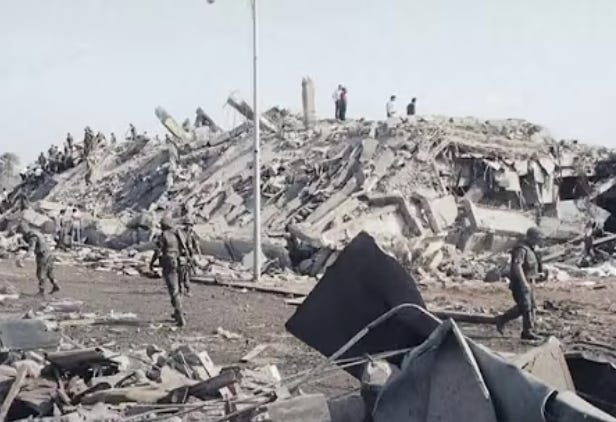Remembering Beirut: The Marine Barracks Bombing and the Lessons of Foreign Policy Restraint
Description
42 years ago yesterday, on October 23, 1983, the early morning quiet at Beirut International Airport shattered when a Mercedes truck carrying 12,000 pounds of TNT crashed through flimsy barriers and detonated inside a U.S. Marine Corps barracks. The explosion killed 241 American service members, including 220 Marines, 18 sailors, and three soldiers, making it the deadliest single day for the Marine Corps since Iwo Jima in World War II.
Almost simultaneously, another suicide bomber struck French forces two miles away, leaving 58 paratroopers dead. The twin attacks temporarily altered American perceptions about Middle Eastern intervention, though the lessons learned that day have proven frustratingly impermanent.
The Islamic Jihad Organization, a precursor to the Shia Lebanese resistance organization Hezbollah, was alleged to have carried out the attack. But the story of how those young Marines came to be sleeping in a vulnerable barracks in Lebanon begins not with militant Shia organizations but with America’s entanglement in Lebanon’s brutal civil war and its unwavering support for Israeli military operations in the region.
Why American Forces Were in Lebanon
Understanding the Beirut bombing requires stepping back to June 1982, when Israel launched Operation Peace for Galilee and invaded Lebanon with approximately 60,000 troops. Defense Minister Ariel Sharon’s objectives were ambitious; destroying the Palestine Liberation Organization (PLO) infrastructure in Lebanon, driving out Syrian forces, installing a Christian-dominated government under President Bachir Gemayel, and securing a peace treaty. Israeli forces besieged Beirut for more than two months, subjecting the city to relentless bombardment that killed an estimated 19,000 people, including 5,500 civilians from West Beirut.
The Reagan administration tacitly approved Israel’s invasion and provided military support through arms and materiel, despite U.S. laws restricting American-supplied weapons to legitimate self-defense. Secretary of State Alexander Haig gave Israel what amounted to a green light for the invasion. CIA analyst Charles Cogan later revealed that Sharon had explained Israeli invasion plans to Secretary of Defense Caspar Weinberger in “great detail ” and Weinberger “just sat there and said nothing.”
The carnage in Beirut became so severe that on August 12, 1982, after eleven consecutive hours of Israeli bombing killed at least 300 people, President Reagan placed an angry phone call to Prime Minister Menachem Begin. Reagan’s exact words were surprisingly choice: “Menachem, this is a holocaust.” The president later wrote in his diary, “I was angry. I told him it had to stop or our entire future relationship was endangered. I used the word holocaust deliberately and said the symbol of war was becoming a picture of a seven-month-old baby with its arms blown off.” Begin ordered the bombing halted within 20 minutes.
Into this maelstrom came American Marines. The first contingent of 800 Marines arrived on August 21, 1982, as part of a multinational peacekeeping force to oversee the departure of approximately 14,000 PLO fighters, including Chairman Yasser Arafat. By September 10, the PLO evacuation was complete, and the Marines departed, their mission seemingly accomplished.
But just four days later, on September 14, 1982, Lebanon’s president elect Bachir Gemayel was assassinated when a bomb exploded during a party meeting, killing him and 23 others. The following day, Israeli forces occupied West Beirut. Between September 16 and 18, Israeli-backed Lebanese Christian militias entered the Sabra neighborhood and the adjacent Shatila refugee camp and massacred between 1,300 and 3,500 Palestinian and Lebanese Shia Muslim civilians. The Israeli Defense Forces surrounded the camps and provided illumination flares throughout the night, allowing the massacre to continue for approximately 40 hours. The United Nations General Assembly condemned it as an act of genocide.
The Marines returned to Lebanon on September 29, 1982, as part of a reconstituted Multinational Force intended to help restore order and stability. What began as an ostensibly neutral peacekeeping mission rapidly became partisan. The United States aligned itself with the Christian-dominated Lebanese government of Amin Gemayel, Bachir’s brother, against Muslim and Druze factions. By October 1983, American forces were no longer perceived as neutral peacekeepers but as belligerents aligned with their rivals in Lebanon’s sectarian conflict. For the Shia militants, the conclusion was inescapable: only by striking U.S. military assets could they assert their grievances and compel a withdrawal—hence the assault on the Marine barracks.
Reagan’s Response and the Strike That Never Happened
On the fateful morning of October 23, Reagan delivered remarks at the White House that combined grief with defiant rhetoric. “I know there are no words that can express our sorrow and grief over the loss of those splendid young men and the injury to so many others,” Reagan said. “Likewise, there are no words to properly express our outrage and, I think, the outrage of all Americans at the despicable act. But I think we should all recognize that these deeds make so evident the bestial nature of those who would assume power if they could have their way and drive us out of that area that we must be more determined than ever that they cannot take over that vital and strategic area of the Earth.”
Reagan characterized the bombing as hideous and insane, describing the perpetrators’ bestial nature and their ferocious, cowardly, and merciless behavior. In his October 27 address to the nation, he stated, “We have strong circumstantial evidence that the attack on the Marines was directed by terrorists who used the same method to destroy our Embassy in Beirut. Those who directed this atrocity must be dealt justice, and they will be. The obvious purpose behind the sniping and, now, this attack was to weaken American will and force the withdrawal of U.S. and French forces from Lebanon.”
But Reagan’s tough talk was not matched by action. On November 14, 1983, Reagan approved a joint U.S.-French air raid against the Sheik Abdullah barracks






